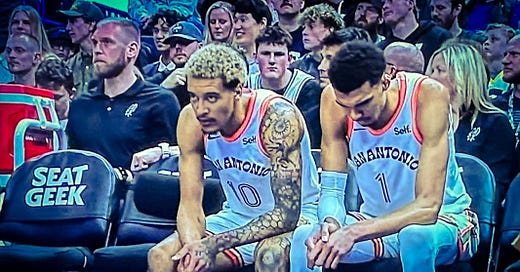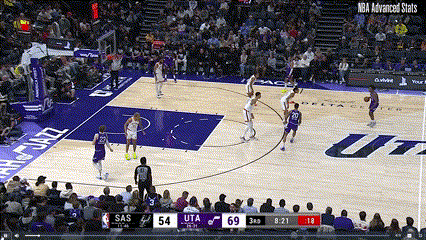Where a comeback bid goes to die
In a microcosm of their season thus far, attention to detail once again killed the Spurs.
Navigating both the literal and figurative terrain of a long NBA road trip is nearly as much a part of a young team’s learning experience as the games themselves. Yes, the private planes that fly players, coaches and staff around the country are damn near five-star hotels 35,000 feet in the air, and yes, the accommodations that await them in a new city every other night are as plush as it gets; but travel is taxing on the mind and body regardless of the amenities available, and this Spurs team needs as many healthy brain cells and functioning body parts as it can get at the moment.
At 11-47, San Antonio has found just about every way to lose this season. There have been blown leads, awful third quarters in otherwise competitive contests, and close games during which they’ve let go of the rope just minutes into the fourth quarter — just to name a few. But there have also been plenty of impressive comeback bids that have fallen just short, because comebacks are difficult when you don’t have the necessary skill level and experience to get over the final hurdles that inevitably block the return path.
Sunday night’s game against the Utah Jazz featured a blend of several elements in the two paragraphs above. The Spurs spent several nights near sea level in Sacramento and Los Angeles before flying to Salt Lake City, a town with an elevation of almost 4,300 feet. And oh buddy, was that altitude change ever evident in their play.
(For what it’s worth, Denver — famously the Mile High City — has the highest elevation of any NBA stop, while Utah is second. Third on the list is Oklahoma City at nearly 1,200 feet, more than 3,000 feet below Salt Lake City. Denver gets a ton of attention as a difficult place to play, and even plasters it all over its arena just to let you know it’s gonna be a challenge that night. Utah doesn’t play it up the same way, but it is just about as tough on opponents.)
After the first few minutes of the game Sunday, the offensive pace with which they like to play began to drag, physicality on the defensive end was virtually nonexistent while the Jazz were running through bodies, tired legs and minds led to poor execution, decision-making and awful turnovers, players were standing still when shots were in mid-flight, and the cameras made sure to show guys gasping for air when they sat down on the bench during timeouts. It was ugly.
But again, this is all part of the learning experience. There is a necessary level of mental preparedness required when playing in Utah or Denver, because not only are you playing a team trying to beat you up, but you’re battling the atmospheric elements as well. They are not your typical NBA cities.
“Very poor start. I think we were a little slow and sloppy today, maybe tired,” Victor Wembanyama told reporters after the game. “So we have to make extra efforts and play smarter than usual, which we didn’t do.”
To San Antonio’s credit, it came alive in the second half, looking like it had just spent the halftime break being pumped full of oxygen. The pace had returned, execution on the offensive end was night and day from the first half, it found variations of a set that worked over and over again (more on that later this week), and players were making shots.
With one massive Wemby dunk to start the third quarter, the comeback attempt was on. And despite a 24-point halftime hole, the Spurs still had plenty of time to crawl back into the game. But they just kept shooting themselves in the foot.
There is an art to the comeback.
Experienced teams appreciate this and understand patience and execution are required even when staring at a large halftime deficit. Twenty-four minutes is a ton of time in today’s NBA, and 24 points is surmountable. Significant, but still surmountable.
Inexperienced teams, on the other hand, often display a tendency to try and get it all back at once. They can feel the momentum flipping and the energy changing, which fuels an urge to speed up the process. And many times, pushing that lever to full steam ahead can be detrimental down the stretch of games.
There were roughly a million reasons San Antonio lost on Sunday — turnovers, fast-break points allowed, free-throw shooting, just to name a few — but I found five second-half possessions I felt killed the momentum they’d been mustering since the second the ball was inbounded to begin the third quarter.
8:16 - 3rd: The Spurs began the half on a 15-6 run and cut a 24-point halftime deficit to 15 before John Collins got the dunk plus the foul.
Not only had San Antonio come out with more energy to begin the third quarter, but its sound defense had thrown off the rhythm of a Utah team that had been firing on all cylinders in the first half. This play began with more good defense before it unraveled: Devin Vassell gets over the top of the Collins screen and stays attached to Collin Sexton’s hip while Wembanyama drops and recovers once the pass back is made. But for some reason, Wembanyama closes out way too hard. Collins had a good night from the perimeter on Sunday, so they had to respect him. But his 34-percent 3-point shooting mark should not garner this much respect.
Wembanyama’s recognition and reaction time to the pass were outstanding, but he took himself out of the play by jumping out as high as he did and allowing Collins to blow by unimpeded.
(Side note: Tre Jones has to either get out of the way or wrap him up. Yes, he was left on an island there, and that note is much more easily said than done, but it’s one of those little things that has to be considered in an effort to not compound the mistake made by a teammate.)
“The game has slowed down for (Victor), I think it’s fair to say. But continuing to be disciplined, do the little things,” Mitch Johnson said filling in post-game for Gregg Popovich, who was reportedly not feeling well. “We still want to focus on … attention to detail, nuances on the scouting report defensively — just some of the small stuff. The hard stuff he’s pretty good at.”
You’ll notice a common thread in each of these clips: avoidable mistakes. NBA teams are going to score, but when a lack of discipline leads to an extra two or three points here and there, it just makes getting over the hump that much more difficult. As Johnson said, it’s the little things.
Keep reading with a 7-day free trial
Subscribe to Corporate Knowledge to keep reading this post and get 7 days of free access to the full post archives.





